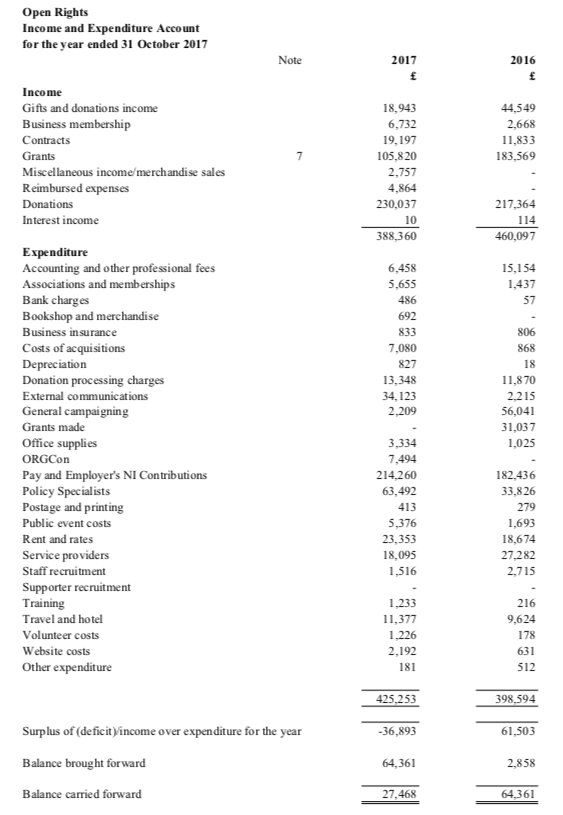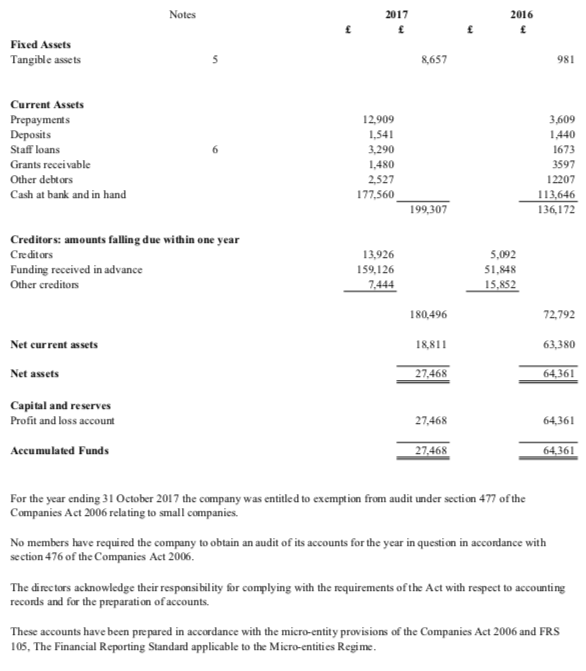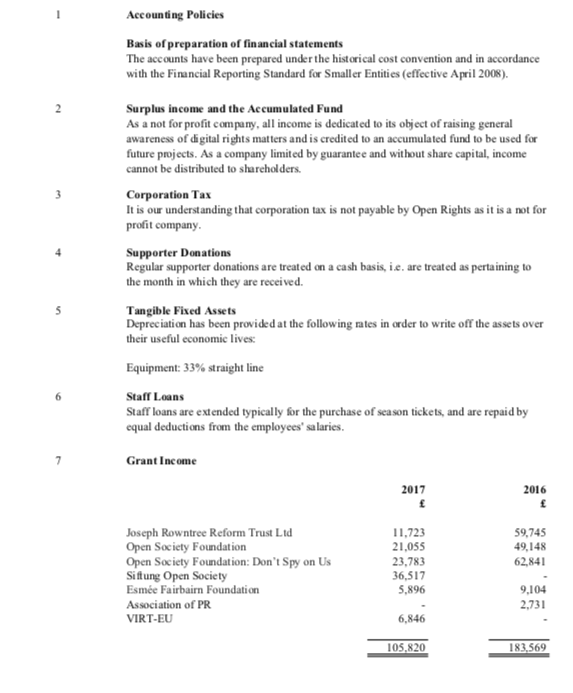Annual Report 2017
Contents
- Company Information
- Directors’ Report
- Accountants’ Report
- Income and Expenditure Account Balance Sheet
- Notes to Financial Statements
Company Information
Directors
James Cronin
Simon Phipps
Alec Muffett
Maria Farrell
Harry Metcalfe
Ben Laurie
Milena Popova
Owen Blacker
John Elliott
Secretary
James Cronin
Accountants
Urban Ledgers Limited
14 Thornhill Square
London N1 1BQ
Bankers
Cooperative Bank plc
PO Box 101
1 Balloon Street Manchester
Company number 5581537
Report of the Board of Directors for the year ended 31 October 2017
The Directors of the company present their annual report for the year ending 31 October 2017.
The Directors would like to thank all of our members, supporters, donors and grantors who make our important work possible. The Directors would also like to thank our staff, volunteers, members of our local groups and Advisory Council for their hard work, support, tremendous knowledge and worldclass expertise.
Our objects, mission and activities:
Our mission is to support the development of a healthy, vibrant and fair society which allows individuals and businesses to live and flourish in the digital age. We do this by working to protect and extend human rights and civil liberties which history tells us are often overlooked or eroded during periods of rapid change.
Our activities include public education and awareness raising, constructive engagement in policy making using our expert research, campaigning and where necessary legal interventions.
Our achievements and performance:
Challenging Mass Surveillance
In late 2016 the the Data Retention and Investigatory Powers Act 2014 (DRIPA) was repealed and replaced by the Investigatory Powers Act 2016.
Open Rights Group challenged the law which enabled state monitoring of everybody’s web history, and email, text and phone records on an industrial scale. We were interveners in a case taken to the Court of Justice of the European Union (CJEU) by Labour MP Tom Watson and the civil liberties group Liberty about the Data Retention and Investigatory Powers Act (DRIPA) arguing that DRIPA’s provisions for blanket data retention contravened EU law and a previous CJEU ruling on the Data Retention Directive. We won, and the UK appeal court referred the case to the CJEU who ruled that:
- Blanket data retention is not permissible under EU law;
- Access to data must be authorised by an independent body;
- Only data belonging to people who are suspected of serious crimes can be accessed;
- Individuals should be notified if their data is accessed. Later, when the Investigatory Powers Act was passed into law, we partnered with Big Brother Watch, English PEN, and computer scientist Dr Constanze Kurz to challenge the UK government’s surveillance of our data at the European Court of Human Rights. This case was joined to another case featuring ten other human rights and civil liberties organisations, and was heard jointly in Strasbourg in November 2017. A verdict is expected from the court before the end of 2018.
Data Protection and Age Verification
2017 saw the passing of the Digital Economy Act into law. The Act introduced a duty for websites hosting pornographic content to actively verify that users are above the age of 18. Penalties for noncompliant websites include requests sent to payment service providers or ancillary service providers to withdraw services from the non-compliant site.
The Act does not contain provisions to secure the privacy and anonymity of users of pornographic sites. Open Rights Group campaigned for their inclusion in the Act, and not merely in non-binding guidance issued by a private-body who have been assigned the role of ‘age verification regulator’. Open Rights Group believe that the Government must ensure that any age verification system it mandates must protect the security of its users’ identities and sensitive personal data by mandating proper security controls and strictly limiting the data collected and stored.
We have worked on this issue since it was introduced in the Digital Economy Bill in 2016. We lobbied MPs and Peers during the passage of the Bill through Parliament and provided them with several briefings and amendments for different stages of the legislative process. Open Rights Group initiated an “Email your MP” action asking members of the public to raise their concerns about the Age Verification technology with their MPs while the Bill was in Parliament.
Data Protection and E-privacy
Open Rights Group fought for privacy rights during the Parliamentary stages of the Digital Economy Bill and raised concerns regarding proposals for bulk data sharing and over the risk of misuse of collected data. We sent a briefing to the House of Commons.
Microsoft v USA was a narcotics case in which the US Department of Justice attempted to order Microsoft to hand over emails that were held on a Hotmail server in Ireland. Open Rights Group signed on to an Amicus Brief in the case in 2017. Microsoft argued that the emails on the server should be protected by the laws of the country where the server is physically located, while the Department of Justice argued that it had the right to demand access to emails stored anywhere in the world as long as the company was headquartered within the United States.
The Microsoft case progressed to the Supreme Court, and hearings were held in February 2018. Before a judgment could be delivered, the US SESTA/FOSTA laws came into place, which repealed the Section 230 ‘safe harbour’ provisions of the Communications Decency Act 1995, which had previously protected internet intermediaries such as Microsoft from incurring liability for the content posted or transmitted by users of their services. The passage of SESTA/FOSTA ultimately rendered the decision in the case moot, and the US Department of Justice requested that the Supreme Court drop the case.
Brexit
The UK voted to leave the European Union in June 2016 and we have been working to ensure digital rights are not eroded in any future Brexit scenario. Our work has been part of a wider effort to build an open, just and rights based society in Britain in the face of unprecedented challenges. Open Rights Group’s work on Brexit is part of a 2-year project funded by the Open Society Foundation.
Orgcon
In November 2017 Open Rights Group held the UK’s biggest digital rights conference, ORGCon. The event was attended by over 500 people and had an online reach of 500,000 people. The event was hugely diverse with a range of workshops, talks and seminars. The topics explored ranged from age verification, killer robots and online abuse, to surveillance, extremism and the impact of Brexit on digital rights.
Digital Governance Consultancy Barcelona
Between September 2016 and early 2017 we helped the City of Barcelona create their new digital strategy, as the city government shifted towards open source, ethical use of data and agile development, in an effort to increase public sovereignty over digital resources and reduce their reliance on large IT contractors. As part of a consortium co-ordinated by the firm Thoughtworks, Javier Ruiz, our Policy Director led a team of senior civil servants in the development of the open source aspects of the new strategy, including procurement, a migration plan for their resources and various pilot projects. Javier drafted the initial version of the overall Code of Practice for the development, contracting and use of technology by municipal authorities. Javier was supported by open source experts from Open Rights Group’s Advisory Council and Open Rights Group Director, Simon Phipps, as well as Paolo Vecchi (Omnis Systems) from our corporate supporter network.
VIRT-EU Project
In January 2017 Open Rights Group started a three year project as part of a consortium funded by the European Union’s Horizon 2020 research and innovation programme, under grant agreement No 732027. The “Values and ethics in Innovation for Responsible Technology in Europe” project, aka “VIRT-EU”, addresses public concerns around emerging data practices, ethics and privacy. VIRT-EU intervenes at the point of design through researching the development cultures and ethics of the nextgeneration Internet of Things (IoT) innovators to see how they can make ethically consequential decisions about code, hardware and data. The aim was to make our results more widely applicable beyond IoT. In 2016 Open Rights Group helped analyse and map ethical practices and tools, and also contributed a comprehensive analysis of the regulation of the Internet of Things in the EU. The objective of the project was to generate a new framework for Privacy, Ethical and Social Impact Assessment (PESIA), which proactively positions ethical self-assessments in the development process of IoT technologies and we led work on building a toolkit for the practical application of the framework.
Open Internet
Blocked.org.uk is Open Rights Group’s project dedicated to introducing transparency and accountability to Internet filtering by testing and logging blocked and censored internet content. Internet Service Providers provide filters that would block content that is deemed to be unsuitable for under 18s. In reality, filters block wide-ranging content, including sites that are specifically designed to give help and support to young people. Open Rights Group continued to run the website blocked.org.uk, which allows anyone to check whether a website is blocked by the main ISPs’ filters. 24,304,557 million sites have been tested and we have built a tool that will allow people to check sites according to genre and location and easily report them to ISPs for correction. The evidence gathered by this reporting tool helps us to increase transparency about the impact of filters.
Scotland
Open Rights Group appointed a Scotland Director, Matthew Rice in May 2017 to drive our work in Scotland forward.
Open Rights Group have successfully engaged with the Scottish Government in the work on identity assurance. We were a key stakeholder in the process and in September 2017 met with the Scottish Government team responsible for providing a “robust, secure and trustworthy mechanism by which an individual member of the public can demonstrate their identity online.”
Open Rights Group were active in engaging in the following consultations:
- In collaboration with medConfidential to respond to the Health and Sport Committee consultation on the NHS Scotland Digital Strategy.
- Responded to the Scottish Law Commission’s consultation on the reform to defamation law in Scotland.
- Reforming the framework for the collection, use, and retention of biometric material in Scotland and creating an independent body to oversee the use of Biometrics in Scotland. Comments on the Equipment Interference Code of Practice for Police Scotland.
Open Rights Group also played a key role in collaborating with members of the Open Government Network in Scotland to call for Post-Legislative scrutiny of the Freedom of Information (Scotland) Act 2002.
Public Events and Local Groups
Open Rights Group local groups supported our work across the whole of the UK in 2017. The groups are led by volunteer organisers and run events and interactive workshops for the public and meet-ups for supporters. In 2017 the local groups ran over 70 events across the UK including a local group organiser summit in Birmingham.
Our Campaigns Open Rights Group ran a total of 20 campaigns including letter writing campaigns, consultation responses and petition actions.
MEP & MP campaigns: 3 MP/MEP actions produced 729 emails from Open Rights Group supporters.
Letters: 5 letter writing campaigns to Government offices & officials produced 5,825 emails from supporters.
Consultations: 3 consultation response actions produced 1,973 consultation responses from supporters.
Petitions: 6 petitions generated over 43,000 signatures. We have included more information about these achievements and our work in our annual report, which is available on our website and in hard copy upon request.
Financial Notes Overview The year to 31 October 2017 was a successful one for Open Rights Group. Our work was supported by a number of foundations, trusts, individual supporters and organisations during this period. We saw an expected decrease in the total income generated because of our grant funding cycles. This was planned for and did not impact our operating activities in 2017.
At the end of 2017 Open Rights Group employed nine members of staff, two part time and seven full time. A number of part-time consultants provided support for different aspects of our work.
Our work was supported by a number of grantors, foundations and trusts which are listed below. The following sums granted were spent in the period:
Joseph Rowntree Reform Trust Ltd £11,723 Open Society Foundation £21,055
Siftung Open Society £36,517
VIRT-EU £6,846
Open Society Foundations for Don’t Spy on Us £23,783 Esmee Fairbairn Foundation £5,896
Income
Total income during this period was £388,360 compared with £460,097 in the previous year, a decrease of approximately 18.5%. This period saw an increase in supporter donations from £217,364 in 2016 to £230,037 in 2017. We have experienced a small amount of growth in our business membership as a result of a scheme we launched in 2016. We experienced a decrease in grant income during this period. This was anticipated and planned for and was a result of the timings around our grant funding cycles.
We are anticipating a slightly higher income in 2018 due to our continued diversification of funding streams. We operate at a reasonably small core expense so we are well placed to withstand any temporary reduction in income without having to reduce our organisational activities.
Expenditure
Total expenditure for 2017 was £425,253 compared with £398,594 in the previous year, an increase of approximately 6%. This period saw an increase in expenditure on staffing and contractors to account for our commitment to our Digital Governance Consultancy and to increase capacity in our policy team. As well as an increase in external communications and campaigning costs. This included materials, websites and graphics we produced. We also worked to decrease some administrative costs to ensure that our spending on our policy and campaigns work were as high as possible.
Balance Sheet
The balance sheet on page 11 of the accounts shows the financial position of the organisation on the 31 October 2017.
Financial Outlook
We have secured grant funding for 2018 and our financial position remains stable and strong and we are well placed to meet our current and future commitments. We rely on the support of our grant funders, individual and corporate supporters to whom we wish to express our sincere thanks. We view 2018 positively and we have a large portion of secured income and a proactive management plan to respond in advance to any changes in forecast.
Reserves
Open Rights Group has ended this financial year with £27,468 in reserves. This period saw our reserves decrease due to a gap in grant funding and a planned increase in campaigning costs.
By order of the Board
James Cronin, Director 17th July 2018
2017 statutory accounts.xlsx
Accountants’ Report to the Directors of Open Rights
You consider that the company is exempt from audit for the year ended 31 October 2017. You have acknowledged, on the balance sheet, your responsibilities for complying with the requirements of the Companies Act 2006 with respect to accounting records and the preparation of the accounts. These responsibilities include preparing accounts that give a true and fair view of the state of affairs of the company at the end of the financial year and its profit or loss for the financial year.
In accordance with your instructions, we have prepared the accounts which comprise the Profit and Loss Account, the Balance Sheet and the related notes from the accounting records of the company and on the basis of information and explanations you have given to us.
The accounting records and explanations provided appear to be reasonable, however we have not carried out an audit or any other review, and consequently we do not express any opinion on these accounts.
Urban Ledgers Limited
14 Thornhill Square
London N1 1BQ



